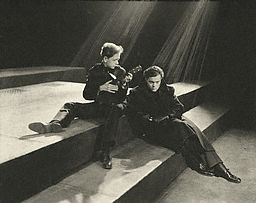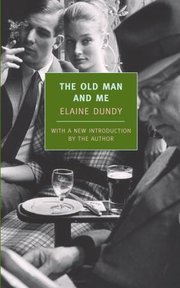I have a lot to say about the off-Broadway revival of Tony Kushner’s Angels in America in this morning’s Wall Street Journal, some of it good, some of it not so good, though the production itself is exemplary. Here’s an excerpt.
* * *
“Angels” is not one but three plays loosely woven together into a two-installment structure….
 Roy Cohn (Frank Wood) is by far the most compelling character in “Angels.” Each time he leaves the stage, the dramatic tension slackens. Herbert von Karajan is supposed to have said that had he written Puccini’s “Tosca,” he would have called it “Scarpia” (who is the opera’s villain). By the same token, my guess is that a fair number of viewers of “Angels in America” would rather be watching a play called “Cohn.”
Roy Cohn (Frank Wood) is by far the most compelling character in “Angels.” Each time he leaves the stage, the dramatic tension slackens. Herbert von Karajan is supposed to have said that had he written Puccini’s “Tosca,” he would have called it “Scarpia” (who is the opera’s villain). By the same token, my guess is that a fair number of viewers of “Angels in America” would rather be watching a play called “Cohn.”
For that matter, any of the three plays that make up “Angels” might well have been more effective had it been presented on its own–but if Mr. Kushner had done that, then the original 1993 Broadway production wouldn’t have been touted by the press as a Major Theatrical Event. To say this, though, is not to cast doubt on the purity of Mr. Kushner’s artistic intentions. Indeed, what is most impressive about “Angels” is precisely that it tries to do so much, that its author was willing to take chances instead of sticking to off-the-rack how-to-do-it theatrical models. That’s why “Angels,” for all its flaws, has been so influential.
Here as elsewhere in his work, the problem is not that Mr. Kushner is overly ambitious, but that he lets his ambitions run roughshod over his sense of proportion. Taken together, the two installments of “Angels” add up to a seven-hour span, which is at least two hours too long….
As for the present production, I think it’s more than enough to note that Michael Greif’s staging is fierce and exact, that Mark Wendland’s compact double-turntable set is a miraculously efficient piece of design, that Wendall K. Harrington’s digital projections add immeasurably to the set’s spatial richness and that the cast is uniformly splendid, with Zachary Quinto, Mr. Wood (who looks eerily like Robert Mapplethorpe’s photo of Roy Cohn in middle age) and the ever-amazing Zoe Kazan taking top honors….
* * *
Read the whole thing here.
To hear a 1968 radio interview with Roy Cohn, go here.
To see Robert Mapplethorpe’s portrait of Roy Cohn, go here.
Al Pacino and James Cromwell play Roy Cohn and his doctor in an excerpt from Mike Nichols’ 2003 TV version of Angels in America:
Archives for 2010
TT: Great Caesar‘s ghost!
 I’ve been wanting to write at length about Richard Linklater’s Me and Orson Welles ever since I saw it on a flight to California earlier this year. Now that the film is available on DVD, I’ve written a “Sightings” column for today’s Wall Street Journal in which, among other things, I talk in detail about the meticulous way in which Linklater and his collaborators have reconstructed the Mercury Theatre’s celebrated 1937 modern-dress production of Julius Caesar, no part of which, alas, was filmed at the time:
I’ve been wanting to write at length about Richard Linklater’s Me and Orson Welles ever since I saw it on a flight to California earlier this year. Now that the film is available on DVD, I’ve written a “Sightings” column for today’s Wall Street Journal in which, among other things, I talk in detail about the meticulous way in which Linklater and his collaborators have reconstructed the Mercury Theatre’s celebrated 1937 modern-dress production of Julius Caesar, no part of which, alas, was filmed at the time:
“Me and Orson Welles” is a coming-of-age screwball comedy in which Zac Efron, lately of “High School Musical,” plays a stage-struck high-school senior who unexpectedly finds himself playing a bit part in “Julius Caesar.” Don’t snicker: Christian McKay’s impersonation of Welles is so accurate as to be spooky, and despite the film’s obligatory (albeit charming) rom-com trappings, I’ve never seen a backstage movie that was truer to the experience of putting on a show.
What makes “Me and Orson Welles” uniquely interesting to scholars of American drama is that Mr. Linklater’s design team found the Gaiety Theatre on the Isle of Man. This house closely resembles the old Comedy Theatre on 41st Street, which was torn down five years after “Julius Caesar” opened there. Using Samuel Leve’s original designs, they reconstructed the set for “Julius Caesar.” Then Mr. Linklater filmed some 15 minutes’ worth of scenes from the play on the Gaiety’s stage, lit according to Jean Rosenthal’s plot, accompanied by Marc Blitzstein’s original incidental music and staged in a style as close to that of the 1937 production as is now possible.
I saw “Me and Orson Welles” on an airplane a few months ago and was floored by the verisimilitude of the results. No sooner did I get off the plane than I looked up the reviews, and was shocked to discover that none of the critics seemed aware of what Mr. Linklater had done. The only article that gave any sense of the film’s historical significance was by Simon Callow, Mr. Welles’ biographer, who flatly declared that Mr. Linklater “got it all right.” And so he did: You will never get any closer to the Welles “Julius Caesar” than by watching “Me and Orson Welles,” whose DVD version also includes a special feature comprised of footage of the reconstructed scenes, not all of which made the final cut….
Read the whole thing here.
* * *
Welles and the original Mercury Theatre cast of Julius Caesar recorded excerpts from the play for Columbia in 1938. To listen to this recording in streaming audio, go here and click on “Mar 1938 The Tragedy of Julius Caesar.”
The theatrical trailer for Me and Orson Welles:
TT: Me and Candace
 Longtime readers of this blog know that Our Girl and I are devoted fans of the comic novels of Elaine Dundy, who died in 2008, not long after I wrote a preface for New York Review Books’ reissue of The Dud Avocado, her most celebrated and successful book.
Longtime readers of this blog know that Our Girl and I are devoted fans of the comic novels of Elaine Dundy, who died in 2008, not long after I wrote a preface for New York Review Books’ reissue of The Dud Avocado, her most celebrated and successful book.
On Monday, Candace Bushnell (yes, that Candace Bushnell) and I will be sharing a platform to talk about Dundy and her work. Our joint appearance, in the course of which I’ll be reading from The Dud Avocado and Bushnell from The Old Man and Me, takes place at the Barnes & Noble on Lexington Avenue at Eighty-Sixth Street. The festivities begin at seven o’clock. I’ve never met Bushnell, so this should be interesting!
For more information, go here.
TT: Almanac
“However incumbent it may be on most of us to do our duty, there is, in spite of a thousand narrow dogmatisms, nothing in the world that anyone is under the least obligation to like—not even (one braces one’s self to risk the declaration) a particular kind of writing.”
Henry James, Flaubert
TT: So you want to see a show?
Here’s my list of recommended Broadway, off-Broadway, and out-of-town shows, updated weekly. In all cases, I gave these shows favorable reviews (if sometimes qualifiedly so) in The Wall Street Journal when they opened. For more information, click on the title.
Warning: Broadway shows marked with an asterisk were sold out, or nearly so, last week.
BROADWAY:
• Bloody Bloody Andrew Jackson (musical, PG-13/R, reviewed here)
• La Cage aux Folles (musical, PG-13, adult subject matter, reviewed here)
• Driving Miss Daisy * (drama, G, possible for smart children, closes Jan. 29, reviewed here)
• Fela! (musical, PG-13, adult subject matter, closes Jan. 2, reviewed here)
• A Life in the Theatre (serious comedy, PG-13, closes Jan. 2, reviewed here)
• Lombardi * (drama, G/PG-13, a modest amount of adult subject matter, reviewed here)
• Million Dollar Quartet (jukebox musical, G, reviewed here)
• The Pitmen Painters (serious comedy, G, too demanding for children, closes Dec. 12, reviewed here)
OFF BROADWAY:
• Alfred Hitchcock’s The 39 Steps (comedy, G, suitable for bright children, original Broadway production reviewed here)
• Avenue Q (musical, R, adult subject matter and one show-stopping scene of puppet-on-puppet sex, reviewed here)
• The Fantasticks (musical, G, suitable for children capable of enjoying a love story, reviewed here)
IN CHICAGO:
• Night and Day (serious comedy, PG-13, extended through Nov. 14, reviewed here)
CLOSING THIS WEEKEND IN ASHLAND, OREGON:
• Hamlet (Shakespeare, PG-13, closes Saturday, reviewed here)
• Ruined (drama, PG-13/R, violence and adult subject matter, closes Sunday, reviewed here)
• She Loves Me (musical, G, suitable for children capable of enjoying a love story, closes Saturday, reviewed here)
CLOSING THIS WEEKEND IN CLEVELAND:
• Othello (Shakespeare, PG-13, closes Sunday, reviewed here)
• An Ideal Husband (comedy, G, too complicated for children, closes Saturday, reviewed here)
CLOSING SUNDAY OFF BROADWAY:
• The Little Foxes (drama, G, unsuitable for children, brilliantly acted but tritely staged, reviewed here)
TT: Almanac
“It’s a complex fate, being an American, and one of the responsibilities it entails is fighting against a superstitious valuation of Europe.”
Henry James, letter to Charles Eliot Norton, Feb. 4, 1872
TT: Snapshot
A rare sound film of Sir Arthur Conan Doyle, the creator of Sherlock Holmes:
(This is the latest in a weekly series of arts-related videos that appear in this space each Wednesday.)
TT: Almanac
“Critics must have been created on the seventh day. Because if God had created them on the first day, what on earth would they have done?”
Edmond and Jules de Goncourt, journal entry, Mar. 8, 1863
